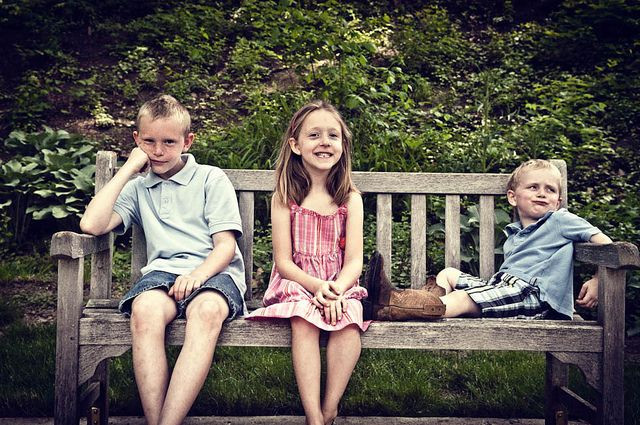Sibling Rivalry Or Cooperation? The Lifelong Effects Of Having To Share Parents

It may be easy to think a sibling is just another body around the house: a waste of space that drains the family’s resources, until one of you moves out and can finally get on with your life. But research says siblings actually mold who we are for decades. They shape our mental and physical health, and predict our personalities.
Take The Good With The Bad
The nuclear family that defined much of the 20th century is on the way out; 2.5 children is no longer the norm. Instead, the typical family branches out in weird ways to include step- and half-siblings, adoptive siblings, and siblings far apart in age. These combinations are vast, which means the net effects of having a brother and sister don’t easily lend themselves to one “sibling experience,” even if that’s how they’re still perceived.
“There are so many characteristics that could make a difference in the experience, whether it’s birth order, gender composition, or the number of years between the siblings,” Corinna Jenkins-Tucker, professor of human development and family studies at the University of New Hampshire, told Medical Daily.
When researchers are backed into a corner, however, for the sake of homing in on certain trends, a number of mental health effects emerge. This is because brothers and sisters, regardless of their half- or step- delineation, wear the hats of both family and peers. Older siblings in particular often act as both friends and guardians, and the research suggests this leaves lasting impressions.
In May, for example, a study found an 18 percent increase in suicide risk for every step down in the sibling hierarchy. The researchers behind the study, a team of sociologists from Stockholm University’s Centre for Health Equity Studies, explained the link as a product of sibling bullying and decreased feelings of parental attachment, which may spur emotional and behavioral problems.
Older May Be Better
Of course, the love-hate relationship wouldn’t be complete without an upside. People with brothers and sisters have consistently been found to be more empathetic, caring, and generous. Even only children who make close friends in day care tend to fall short of the bond forged by siblings. This is because brothers and sisters don’t just hang out and play; they also fight on a daily basis, which means they have to make up on a daily basis. They have to learn to compromise and sympathize, two things best friends don’t always get in such high doses.
These acts of stern parenting trickle into educational outcomes, too. Research has found that older siblings tend to outperform younger siblings in the classroom, mostly because parents don’t want their first children turning out rotten. So they take extra precautions to keep the kid in line, which may eventually relax as parents have their second and third. As the discipline fades, academic achievement may follow.
In certain cases, Jenkins-Tucker says, this phenomenon isn’t limited to macro influences like how one sibling is raised over another. It can also happen day-to-day, in the form of “parental differential treatment.” Whether kids recognize they’re being treated wrongly, as opposed to strictly different, depends on whether they see the differences as fair. “Say you have a child with a physical challenge, you might understand why your parents spend more time with that child,” Jenkins-Tucker said. “But generally being the unfavored kid is linked with lower well-being.”
Though less studied, there’s also evidence to suggest sibling effects crop up in people’s physical health. For example, kids with half-siblings are more likely to engage in drug use and sex early in life. If siblings have an older brother or sister who is obese, in addition to parents who are obese, the obese siblings are more likely than the parents to influence the child’s weight. Here Jenkins-Tucker points directly to the dual role older siblings play as role models, be they positive or negative in nature.
“Siblings do make a contribution to individual mental and physical health,” she said, “and often it’s been shown to be unique over and above what parents do.”
On Parents’ Shoulders
Separately, these threads make understanding sibling effects much more challenging and complex. But braided together, they seem to suggest a common element in the importance of parenting. The more parents can be aware of, the more they can prepare for.
Older siblings, for instance, often spend most of their early lives as only children. It’s up to parents to make that transition a smooth one. Kids want to avoid feeling dethroned, as Jenkins-Tucker puts it. The trick to actually doing this, she says, is making sure they get involved in family matters related to the new baby. Parents can give the old sibling new responsibilities so they feel, and are, included. And they can prepare the older sibling for the new role ahead.
Parents should also be wary of the mentality that sibling rivalries are somehow trivial, or embedded in the mythical “sibling experience.” The truth is that any conflict, if it’s left unresolved, can lead to aggressive tendencies later in life. Instead, parents should see the spats as teachable moments for their kids to cultivate a sense of fairness and compassion. That way, they may grow up with a clearer sense of how to interact with others and, unlike those pesky self-absorbed only children, feel OK when things don’t go their way.



























